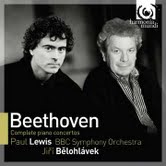In review--Emerge triumphant
Beethoven Complete Piano Concertos
Harmonia Mundi
For many listeners, hearing Beethoven’s music could feel triumphant, victorious, and invigorating. For other listeners, the German composer’s work might feel fraught with anger, frustration, and darker emotions that they would rather not address. But for all of us, Beethoven can lead us into our darkest places where we can heal our wounds and emerge triumphant. That’s the journey that most of Beethoven’s music represents, bordering on shamanic, raising the dead parts of ourselves, and liberating ourselves from our oppressors, both inner and outer. Beethoven’s 5 piano concertos prove no exception to this concept.
Our musical shaman in this case is pianist (I’m assuming he’s English) Paul Lewis who in the realm of Beethoven, takes charge of this domain and plays the concertos with a sense of authority and mastership. You can feel the triumphant moments as well as the sensitive and fragile ones soaring off the keys of the Steinway that Lewis plays. I don’t envy the virtuosos that tackle Beethoven’s music since the cadenzas represent real workouts, physically, emotionally, and mentally or the musician (soloist) must capture each Beethoven moment and shape it into fire, steel and alternately gossamer wings. Similar to the works of Rachmaninoff, Prokofiev (late Romantic composers) or Liszt, Beethoven didn't compose for the faint of heart. And perhaps, because he suffered from a hearing loss, his strong heart compensated for the loss of a musician’s greatest sense, his ability to hear.
According to the liner notes for Beethoven Complete Piano Concertos, when Beethoven performed the first 2 piano concertos he composed only the orchestra parts and improvised on the piano. The scores performed today represent a composite of the improvisations. By the third concerto the composer developed a mastership over the form and the piano parts were composed along with the orchestra ones—this was around the time when Beethoven could publish his music. And the third concerto turns out to be my favorite of the 5. It feels like the peak of Beethoven’s achievement with the concerto form. The orchestra and solo piano create a perfect balance and the concerto’s three movements are achingly beautiful.
All the concertos feature bold call and responses between the piano and orchestra, plenty of piano runs, sometimes on both hands, and playful childlike moods alternate with stark serious ones. When I listened to the concertos, I chose my favorite movements, such as the largo on the first concerto and the cadenzas in the first movement of the first concerto. I found the second concerto sweeter and more melodic than the first and at times the piano rolled gently along in a soothing manner.
I felt least impressed with the fifth concerto, perhaps because listening to 5 Beethoven concertos in a short period of time can lead to burn out. There were times throughout my listening to the three discs where Beethoven’s sensitivity blew me away, moments when his more fragile passages caused tears to mist my eyes. There were times when I felt sad that I live in another time and place than the composer because I would have enjoyed knowing a fellow human with such a range of emotions, including humor. Yes, I think it was the last movement in the third or fourth concerto that caused me to chuckle, and I don’t even know what the joke was, but it was funny nonetheless.
This is the first complete recording I’ve heard of Beethoven’s piano concertos, but I leave it feeling satisfied and impressed. The BBC Symphony Orchestra led by Jiřì Bêlohlàvek creates a fantastic partnership with Lewis. I highly recommend this recording for those of you with strong hearts and those of you now ready to face your inner demons and emerge victorious. It might not be the most joyful ride you’ll ever take, but among the most important. Beethoven knew something about spirit and spiritual evolution, that you can be sure.
http://www.harmoniamundi.com





Comments
Post a Comment